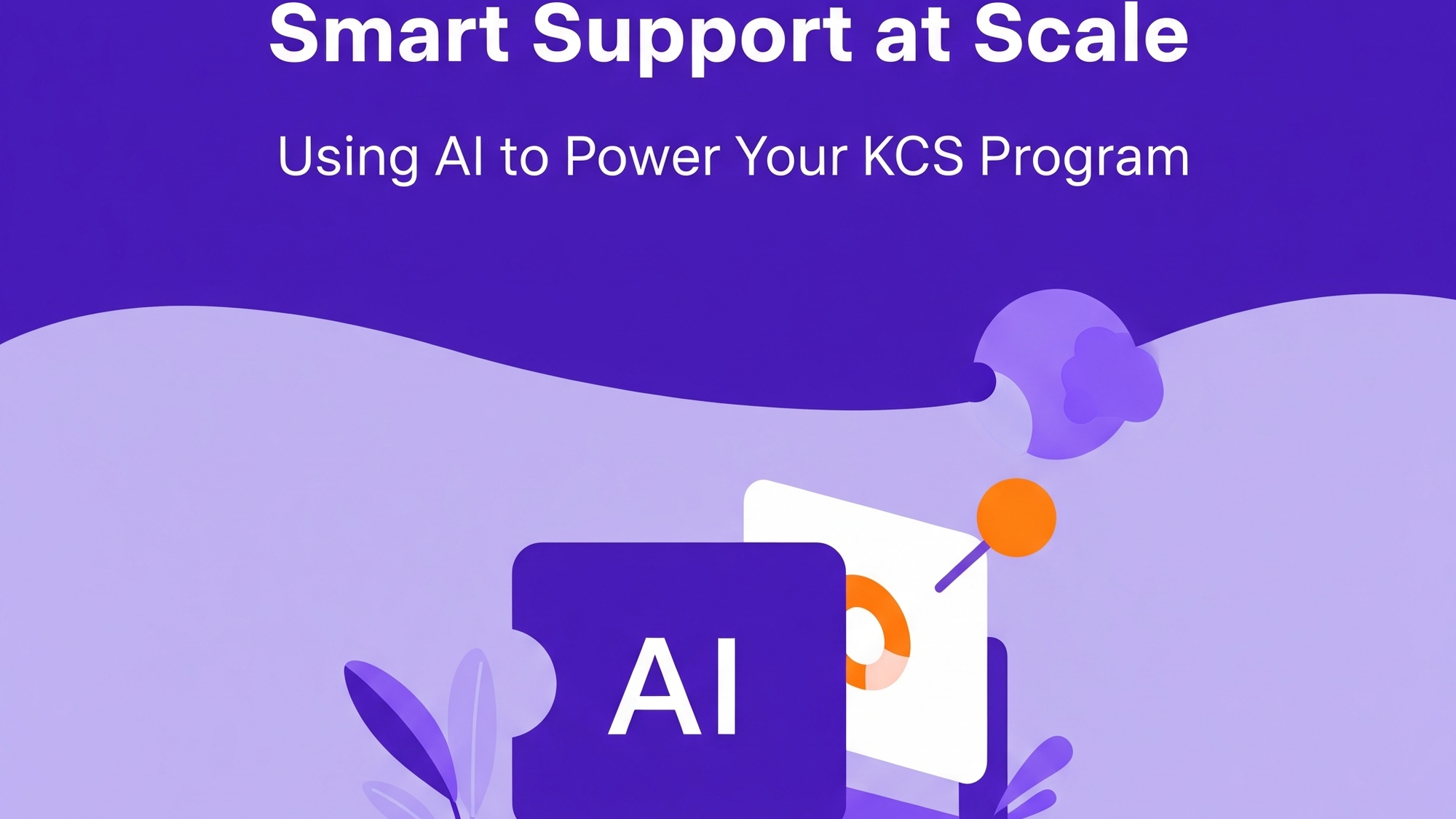Reducing Case Volume with AI-Driven KCS

In enterprise SaaS, we spend a lot of time reacting. Reacting to cases, to escalations, to missed SLAs. And when the case volume increases, we try to hire more agents, create more macros, maybe redesign some workflows. But all this feels like patching holes in the wall.
What if we fix the root cause instead?
This month, I want to talk to you about one of the most powerful – and most misunderstood – strategies to reduce inbound case volume: Knowledge Centered Service (KCS), powered by AI.
🧠 What is Knowledge Centered Service (KCS)?
KCS is not a tool. It is a methodology. Designed originally for support and customer success organizations, it integrates the creation and improvement of knowledge into the everyday workflow of solving cases.
Instead of a separate documentation team writing articles after cases are closed, KCS encourages agents to capture knowledge while they work – during the case-solving process.
This means:
- The knowledge base grows with every resolved case.
- Reusable solutions get written once, used many times.
- Customers can find answers before they open a ticket.
The ultimate goal: Shift left. Prevent tickets. And when tickets do come, resolve them faster and more consistently.
🛠️ The 4 Steps of Implementing KCS (Simplified)
- Capture: When a case is solved, the agent captures the resolution as an article – in the words of the customer.
- Structure: The article is written in a consistent, findable format – usually following a template (e.g., problem, environment, resolution).
- Reuse: Agents search the knowledge base before solving the case. If an article exists, they link to it. If not, they create one.
- Improve: Articles are reviewed and improved continuously – by peers, coaches, or through feedback loops.
Seems easy? It's not. Adoption is the hard part. And here is where AI can help.
🤖 How AI Can Accelerate KCS
Many tasks in KCS are repetitive, structured, and don’t require deep human creativity. That’s where AI models are strong.
Here are the main tasks AI can support or automate:
| KCS Task | Can Be Automated? | AI Role | Human Value |
|---|---|---|---|
| Identifying duplicate tickets | ✅ | NLP clustering, embeddings | Confirming false positives |
| Capturing draft articles | ✅ | LLM-based case summarization | Editing for tone and clarity |
| Tagging and metadata | ✅ | Auto-tagging models | Curating taxonomy |
| Measuring knowledge usage | ✅ | Analytics and dashboards | Interpreting insights |
| Validating correctness | ❌ | Not fully safe yet | Human reviewers required |
| Deciding knowledge gaps | ❌ | Needs context | Human-led strategy |
We’re seeing LLMs like GPT-4o, Claude, and Mistral perform surprisingly well in summarizing support cases into usable drafts. But these drafts still need a human’s judgment – especially when stakes are high or environments are complex.
🚀 Deployment Strategy for AI-Supported KCS
Here is a phased approach to get started, with a human-in-the-loop model from day one:
Phase 1: Foundation
- Audit your case data and knowledge base.
- Define your KCS templates and metadata standards.
- Train your agents on the KCS process (start small, pilot team only).
Phase 2: Augmentation
- Introduce AI summarization for creating article drafts from closed cases.
- Add AI-powered search to suggest related articles to agents.
- Use AI to tag articles consistently.
Phase 3: Automation
- Auto-suggest articles during ticket triage.
- Group similar tickets using embeddings (prevent duplicates).
- Auto-summarize trends in knowledge reuse.
Phase 4: Optimization
- Use feedback loops from agents and customers to improve AI suggestions.
- Reward article usage, not just article creation.
- Review low-performing content with a mix of analytics and human feedback.
The golden rule: Don’t let AI replace the human. Let it empower them.
⚠️ Challenges You Must Be Ready For
- Cultural resistance – Agents may see KCS as extra work. Until they see the value, adoption will be slow.
- Quality control – AI can write, but it can also hallucinate. Have a review process in place.
- Searchability – Even the best article is useless if it can’t be found. Invest in AI-powered semantic search early.
- Language diversity – Global SaaS teams need multi-language support. LLMs can help translate and standardize tone across languages.
💡 Final Thoughts
KCS is not just a way to reduce case volume. It’s a way to build organizational memory. When you combine it with AI, you unlock a new dimension: self-improving support.
We’re still early in the curve, but the potential is already visible:
Less firefighting, more strategic problem-solving.
Less case handling, more value creation.
The future of support is not just faster. It’s smarter.

